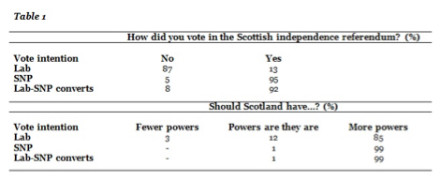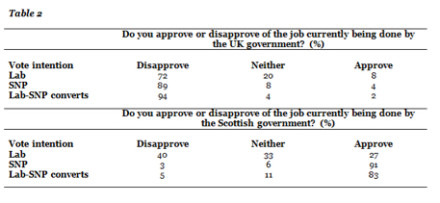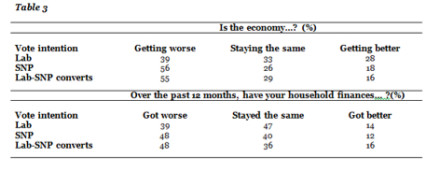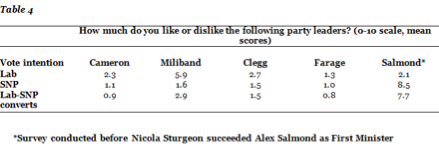Much has been made of the SNP’s current poll lead in Scotland. They have been consistently and significantly ahead of Labour since the independence referendum, with the last week’s Survation poll putting the nationalists 18 points clear. If this trend continues, Labour stands to lose dozens of key seats in Scotland in May, which will dent Ed Miliband’s chances of forming a government.

It is widely assumed the SNP owe their popularity to a mass defection of disenchanted Labour voters, particularly in the party’s working-class heartlands. But what do we actually know about these converts?
The British Election Study’s (BES) 2014 internet panel survey (i.e. the same group of interviewees each time) provides some answers. Surveys were carried out in the Spring and Autumn, before and after the referendum. The following tables contain data from the Autumn wave and examine some views of:
(1) consistent Labour voters (those who said in both Spring and Autumn they intend to vote Labour in May)
(2) consistent SNP voters
(3) voters who switched from Labour to SNP between Spring and Autumn.
The panel study is helpful as we know for certain the converts once backed Labour – we are not dealing with the ‘I used to vote Labour, but…’ crowd. A word of caution: the sample contains only 166 converts compared to 805 and 1105 consistent Labour and SNP voters respectively. There is, however, a noteworthy pattern: converts are attitudinally closer to SNP voters than Labour voters.
Table 1 displays referendum voting patterns and general views on further devolution. Labour and SNP voters unsurprisingly diverge on the independence question. However, converts are much closer to SNP voters on the issue with 92% voting Yes, despite pledging support for Labour only months earlier. There is consensus among the three groups for further devolution but Labour voters are slightly more comfortable with the status quo.

Table 2 highlights a similar trend. While all three groups disapprove of the Coalition’s record, SNP voters and converts are highly supportive of the Scottish government. Labour voters, on the other hand, are fairly hostile to the SNP administration.

The economy has been the policy battleground in the run-up to May, and it is vital Labour shows itself capable of competent economic management. Unfortunately for the party, while Labour voters are split on the issue, converts are just as concerned about the economy as SNP voters. Table 3 also shows almost half of SNP voters and converts feel their personal finances have got worse, compared to 39% of Labour voters.

What should also be of concern is Ed Miliband’s popularity among Labour voters relative to Alex Salmond’s among converts. Table 4 shows Miliband scored an average of 5.9/10 among his own supporters compared to Salmond’s average score of 7.7/10 among converts.

Perhaps most worrying for Labour is that conversion may not be a short-term phenomenon. Interviewees also stated their ‘party IDs’, which generally measures longer-term commitments to parties beyond single elections. Table 5 shows 81% of converts identified as Labour in Spring; by Autumn 50% had switched to the SNP. Less than one third of converts remain Labour identifiers.

The data suggests (Scottish) Labour should embrace further devolution and tackle voters’ economic insecurities to attempt to regain support; Jim Murphy has made headway on both issues becoming leader. Miliband’s popularity remains a problem, however, and is unlikely to improve significantly before the election. The responsibility therefore falls on Murphy to prove he is a credible and effective Scottish Leader. He has made a good start but the question remains whether or not Labour can recover sufficiently in three months to prevent massive SNP gains. And if conversion is indeed a longer-term trend, the party, at least in Scotland, may face even more painful years in opposition.
Kenny Stevenson is a PhD researcher at the University of Strathclyde studying British immigration policy and public opinion. He is a member of Glasgow Cathcart Constituency Labour Party.




More from LabourList
Letters to the Editor – week ending 15th February 2026
‘Labour council candidates – it’s tough, but all is not lost’
‘Labour won’t stop the far right by changing leaders — only by proving what the left can deliver’